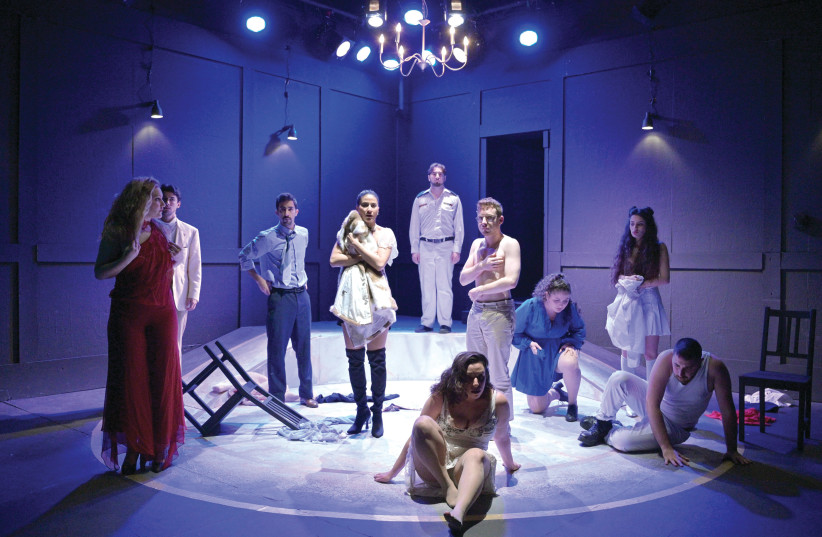Regarded as so explosive by its Jewish-Viennese author Arthur Schnitzler that at first, he intended for it to be read and performed at private parties only, La Ronde is an almost clinical study of the social pathology of desire. Its first staged performance was such a scandal that Schnitzler, a medical doctor, was publicly branded a Jewish peddler of pornography.
Directed by Rakefet Binyamin, Schnitzler’s most performed work now gets a new life at Beit Zvi.
A snapshot of Viennese norms before the Great War, the play follows a range of very distinct characters, from a prostitute (Yuval Reis) to a count (Sagi Pomeranz). We get to know a so-called “decent” husband (Dvir Ona), his unfaithful wife (Nitsan Leibovitch), and the shopgirl (referred to as “sweet child” in this production) whom the husband (Ofir Shababo) is seeing, and learn more about the alleged lives of people than we might wish.
Set designer Nofar Drezner created an actual circle for this adaptation. All dialogs, dances, actions, and celebrations take part within its circumference.

During the brutal rape scene with the rough soldier (Yuval Fishfeld Nossan) and Marie (Liraz Rishoni), the solution imagined by costume designer Rona Mishol is for Nossan to control Rishoni via harnesses, which are concealed in her costume. When she attempts to flee, her movement is limited to the major ark of the circle. During another scene, the husband (Ona) symbolically devours the “sweet child” (Shababo) in a posh restaurant. The smiling waiters offer him utensils and politely affirm his act – for a paper note.
This scene has added charm thanks to Matan Barda, who elegantly snaps his fingers at the other servers. The stage manager for this particular performance, Barda also played the student. Cheering and grinning pals encourage him to continue his affair with the married woman. Like the husband, the student is not precisely a monster, simply a person unable to have his cake and eat it, too. The delights these men enjoy are usually at someone else’s cost – often a woman.
Mishol excels in crafting beautiful, erotically charged costumes for Schnitzler’s female heroines. This is especially true for Gal Madmoni (in the role of the beautiful actress) and for Shababo. Thanks to Mishol’s skills, male characters are also quite distinct. Robert, the playwright (Eden Bitton), is dressed to the nines. Bitton portrays him speaking in such an over-literary manner that the effect is quite droll. Hats off to the translator, Ehud Manor.
Allusion throughout the play
Schnitzler’s play alludes to syphilis, yet the word is not spoken once throughout the play. Instead, we hear the tick-tock of a watch counting the moments as characters live out their desires. This timekeeping might signify that they have become diseased, or that they are simply attempting to find a few moments of release during the last gasps of the Habsburg Empire. Leibovitch, as the married woman having an affair, offers fiery flamenco, full of passion and emotion, driving this point home.
During this cynical (some would say clinical) play, the one moment of real communication is offered not via sex but by the creative act of co-writing. There is a wonderful scene between Madmoni and Bitton when the actress gifts the playwright a typewriter. The charm of that moment alone would make this fantastic adaptation worth watching.
La Ronde by Arthur Schnitzler will be shown at Beit Tzvi Theater, Shu’alei Shimshon 2, Ramat Gan. Sun., March 10, 8:30 p.m. and Mon., March 11, 7 p.m. NIS 50-60 per ticket. Call (03) 579-9290 to book. Roles alternate between acting students. Hebrew only.
